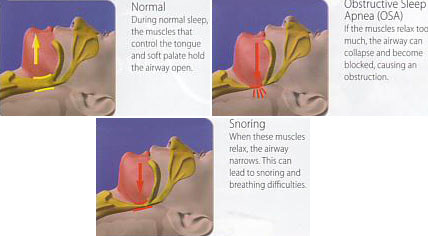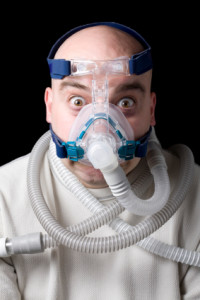Sleep Apnea

Snoring is the physical act of breathing and making harsh or guttural sounds during sleep. Although snoring is frequently harmless, it may develop into a serious medical condition known as “Obstructive Sleep Apnea (OSA)”. This condition interferes with our quality of sleep, overall health, and can be dangerous if left untreated. Surprisingly, over 20 million Americans suffer from OSA and don’t even know it!
Snoring has been acknowledged as a warning sign that normal breathing is not taking place during sleep. A narrowing of the airway in the back of the throat most frequently causes snoring. Soft tissues, in particular the soft palate, uvula (the small piece that hangs from the back of your throat), tonsils, and tongue, may reduce this airway space. When the tongue relaxes during sleep and blocks the airway causing an obstruction, breathing often becomes labored, noisy, and may stop, which results in apnea.
The airway obstruction will not clear until the oxygen level to the brain falls low enough to partially awaken the sleeper, usually resulting in a loud gasp. Someone with “Obstructive Sleep Apnea” may experience episodes where breathing stops for at least 10 seconds. This can occur thirty or more times a night. These abrupt disturbances during sleep place significant strain on your heart and cardiovascular system. This condition is associated with diabetes, high blood pressure, higher risk for heart attacks, and strokes! It is important to note that not everyone who snores has OSA.
- Loud snoring
- Waking up during sleep feeling “choked”
- Waking up with headaches
- Excessive daytime sleepiness, tiredness, or problems concentrating
- Dry mouth and throat in the morning
- Lost interest in sex
- Sudden short-of-breath awakenings (choking or gasping)
Check these syptoms of sleep apnea to determine whether or not snoring is a problem that needs further attention.
Dr. Bennett will perform an intra-oral exam to determine where the blockage is and what is causing the obstruction. An acoustical vibration analysis (called a Pharyngometer) of the airway will be performed and aids in the proper diagnosis. The Pharyngometer testing can help determine the exact position the upper and lower jaw relationship needs to be in for the best possible success.
Dental appliance therapy is an alternative treatment for patients with mild or moderate OSA, and for snoring. The dental appliance is a plastic device and looks similar to a double orthodontic retainer or athletic mouthpiece. The goal of the appliance is to prevent the tongue and other soft throat tissue from collapsing and obstructing the airway during sleep. Dr. Bennett has received special, extensive education and training in dental appliance therapy and, can design and fit these special appliances to meet each OSA/Snoring patient’s individual need and condition.
One such device, the Somno Med MAS (Mandibular Advancement Splint) has been approved by the FDA for the treatment of snoring and mild to moderate sleep apnea. The device has been used in Australia for more than 7 years. Several other FDA approved applicances are also available.
Compliance with these intra-oral devices is high and, in the event of complication, the treatment is “reversible” since the appliance may be removed by the patient at any time.
Here are a few of the many benefits of an oral appliance approach:
- Low cost
- Non-invasive treatment (no surgery)
- Easily accepted by patients
- Comfortable to wear
Please note: We are now a Medicare DME non-participating provider.
If you or someone you know is experiencing any of the symptoms listed above, please call our office at 918-582-8651 to schedule an examination.



